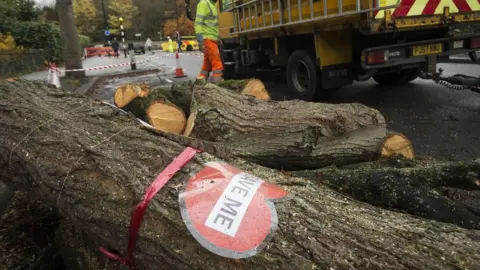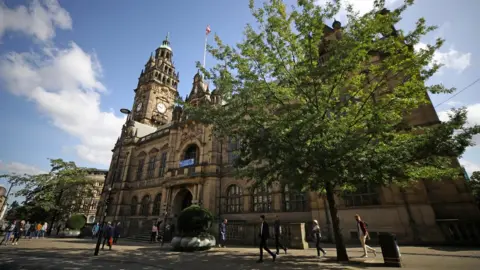Sheffield Council transparency inquiry hampered by lack of data
 PA Media
PA MediaA report into whether Sheffield Council complied with Freedom of Information requests was "significantly hampered" after the authority was unable to provide much of the data requested.
Law firm Bevan Brittan said the lack of information "limited our ability to make findings and recommendations".
The inquiry was launched after an anti-tree felling campaigner complained about information being withheld.
The council said it had improved its record management procedures.
The law firm's inquiry, which cost the council £35,900, checked 20 FOI requests, 10 of which related to the city's controversial tree-felling policy.
It found that the council "could not locate and provide all of the relevant information in the case of 13 requests and that it "raises concerns regarding records management".
Regarding the FOI requests, the report found in some instances the council had "undertaken a practice of labelling information arising from the tree-felling programme which they considered to be sensitive as 'Not Subject to FOIA.' This practice was inappropriate. Officers accept this and the practice is (as far as we are aware) no longer used".
The report added "we have not seen evidence that information was deliberately withheld to avoid publication".
 PA Media
PA MediaCouncil leader Terry Fox said the report was commissioned as the council "wanted to ensure that any areas where we fall short could be identified and acted on".
"Although the report makes for uncomfortable reading in parts and does not reflect what we want to be as an organisation, we welcome the recommendations and are committed to implementing the necessary changes to improve how we handle requests for information," he said.
The tree-felling scheme was part of a £2.2bn, 25-year street improvement project starting in 2012.
The authority, which was planting new trees after removing existing ones, insisted the trees earmarked for felling were diseased, dying, dangerous or damaging.
Some of the trees felled by council contractors Amey were healthy but still classed as dangerous or damaging, and opponents of the scheme said alternative options should have been pursued to save those trees.

Follow BBC Yorkshire on Facebook, Twitter and Instagram. Send your story ideas to [email protected].
